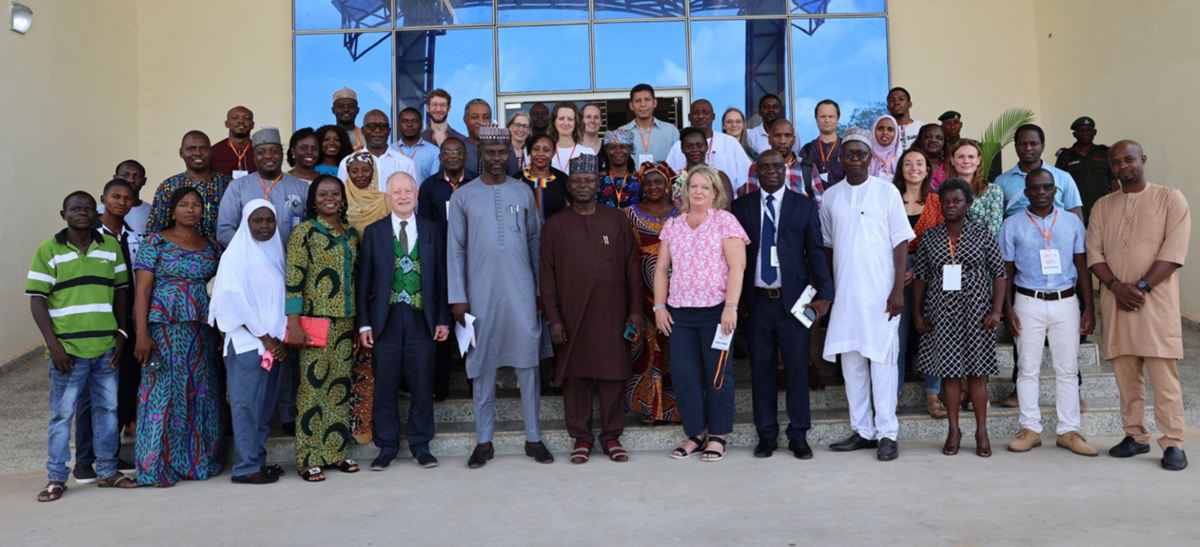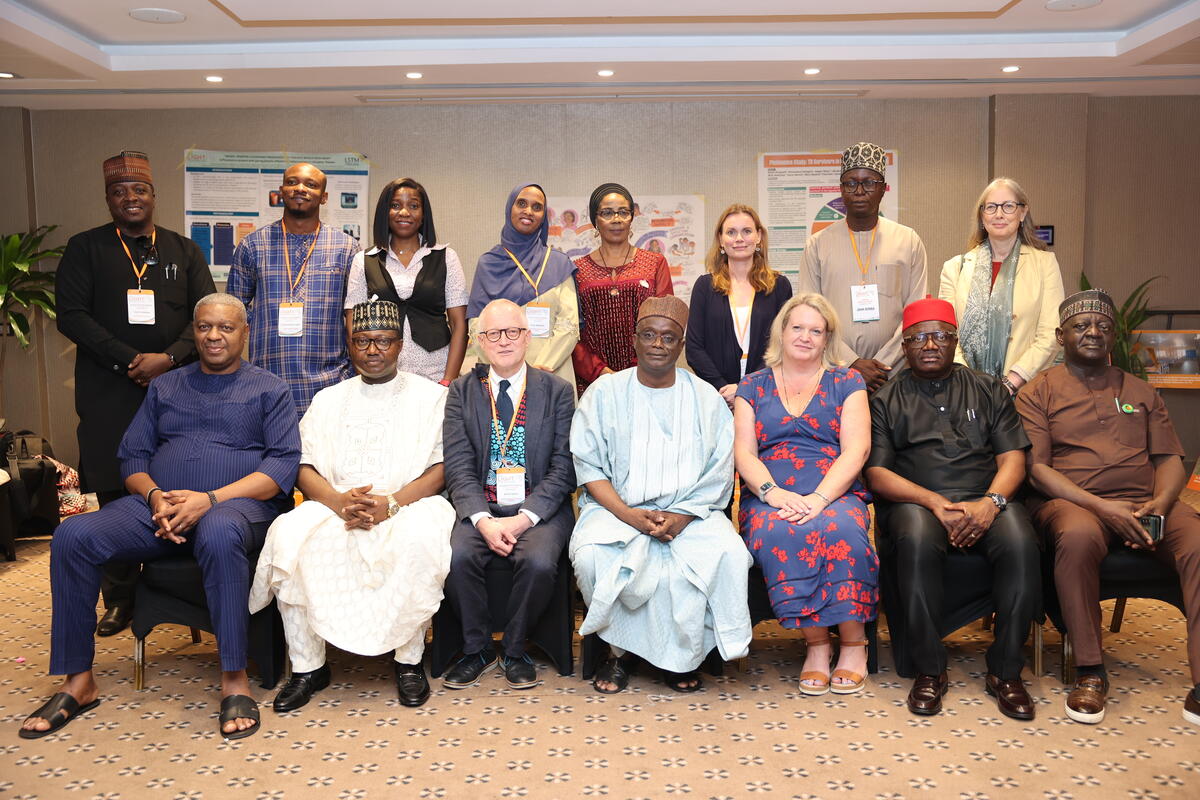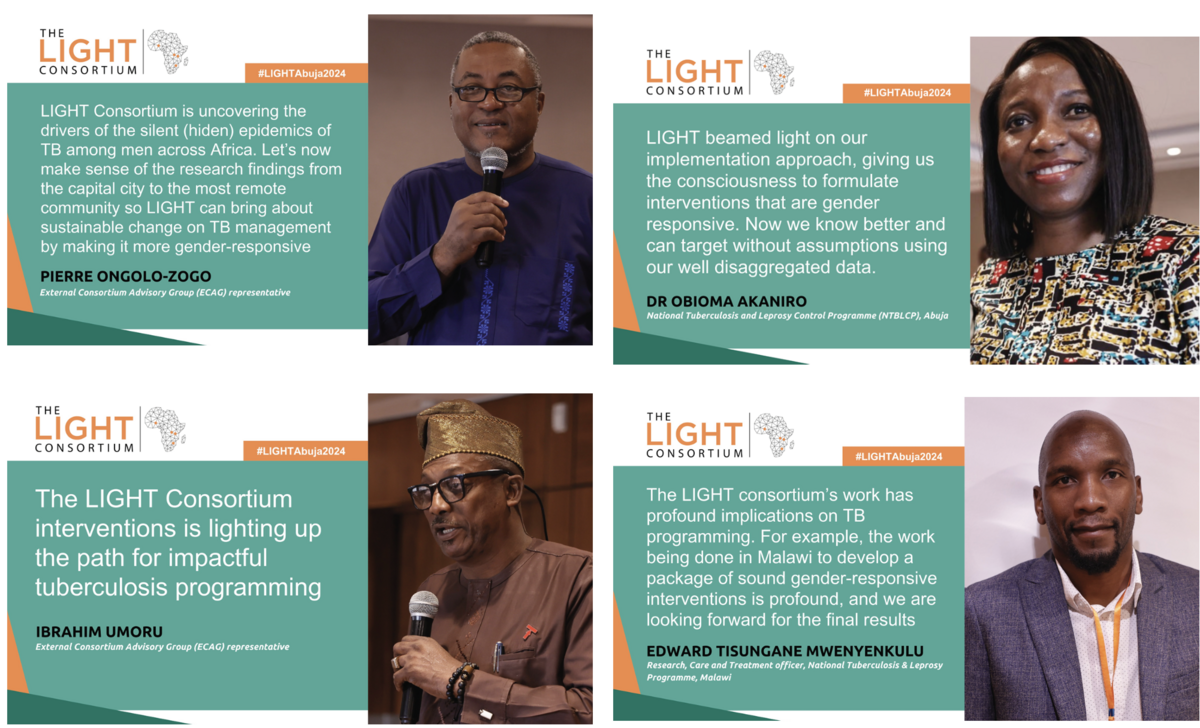Authors: LIGHT RU Team
The LIGHT Consortium annual meetings are pivotal for strengthening partnerships and collaborations within and outside the consortium—including key national stakeholders and TB-affected communities. These meetings provide a platform for partners across LIGHT countries—Kenya, Malawi, Nigeria, Uganda, and the UK—to share progress, discuss upcoming opportunities for impact, and strengthen relations through exchange of learnings, experiences, challenges and innovative solutions towards transforming TB pathways to care.

TB-affected community members in Abuja with LIGHT partners from UK, Malawi, Nigeria, Uganda, and Kenya at Bingham University where Zankli Research Centre is hosted. October 23, 2024. Photo credit: LIGHT
The Year 5 Partners’ Meeting, held in Abuja, Nigeria (22-24 October 2024), was hosted by the Zankli Research Centre (ZRC), LIGHT’s partner in Nigeria. The gathering brought together consortium partners, alongside key stakeholders including representatives from the National TB and Leprosy Programme (NTLP), the External Consortium Advisory Group (ECAG), Country Advisory Group in Nigeria (NCAG), Nigerian Parliamentarians, and TB-affected community members.
The meeting showcased LIGHT’s progress across various areas, including co-creation and testing of research interventions, participatory action research, modelling work, capacity strengthening, and research uptake. Discussions also highlighted emerging impacts on gender-responsive TB programming and policy dialogues.
Key Sessions
1. Panel with NTLP and ECAG: This session served as an important checkpoint for assessing how LIGHT’s progress aligns with national and international TB priorities. The panelists identified challenges, successes and opportunities to guide impactful planning over the program’s final 18 months.
2. Panel with External Stakeholders: Discussions with representatives from NTLP, Global Fund, NCAG, Global TB Caucus, and other TB organisations, focused on strengthening gender-responsive and equity-focused TB prevention and care by leveraging LIGHT’s evidence to inform policies and practices within national and governmental institutions in Nigeria. Key topics included meaningful community engagement, leadership to address health equity challenges, and opportunities within the funding landscape to support transformative programming. Panelists emphasised actionable priorities for advancing gender-responsive approaches, highlighting the critical role of collaboration and reaching out to politicians with clear key asks informed by evidence, and strategic alignment in achieving sustainable impact.
3. Visit to Esu Karu Palace: This cultural engagement underscored the vital role of traditional leaders in raising awareness about TB and driving behavioural change at the community level, particularly on issues with strong cultural significance. Insights from ZRC’s focal points revealed how the involvement and influence of these leaders can successfully shift attitudes and practices (e.g. reducing TB-related stigma), boosting the impact of LIGHT’s research.
4. Project Carousel: This interactive session allowed project teams to present their research and community-driven activities through hosting rotating groups at their tables, sparking engaging discussions, questions and observations. It combined fun with serious deliberations, making it a highlight of the meeting. The enthusiasm was evident, with questions flowing long after the session had ended.
5. Nigeria’s Parliamentary Committee Panel: An evening session with Nigeria’s Parliamentary Committee on HIV/AIDS, TB and Malaria emphasised the critical need for collaborative action to end TB. The discussions focused on key priorities such as ensuring government accountability and advocating for cross-ministerial social protection measures to support individuals affected by TB. This dialogue reinforced the importance of unified efforts in driving sustainable impact and advancing efforts towards ending TB in Nigeria.

Key Reflections and Insights
- Assessing and reflecting on impact: Reflecting on impact is an iterative process, where everyone within LIGHT and those partnering with LIGHT were encouraged to regularly evaluate our collective and collaborative contributions to ending TB by asking, "What value are we adding?" and ensuring we address the critical "So what?" question. A key takeaway was the need for impactful communication such as succinctly conveying LIGHT’s value to policymakers during brief encounters.
- Acknowledging policymakers’ experiences: Engaging policymakers effectively requires acknowledging their personal experiences and linking them to LIGHT’s evidence and narratives to drive meaningful change.
- Embracing Intersectionality: Effectively addressing TB requires a nuanced understanding of the complex, intersecting factors—such as gender, socioeconomic status, and cultural norms—that influence the impact of TB on diverse populations, including both men and women. By identifying and addressing these multifaceted drivers of the TB epidemic, resources and policy decisions can be strategically directed to areas of greatest need, ensuring more targeted and impactful interventions.
- Strengthening NTLP capacity: It is important to continue strengthening the capacity of the NTLPs to understand and appraise data/evidence needed for informed decision-making. While NTLPs collect valuable routine data, much of it remains underutilised. Providing the necessary support to turn this data into useful and accessible publications that politicians can understand is crucial for driving impactful change. LIGHT’s modelling work could be key for NTLPs seeking effective and evidence-based TB models to refine and improve their programming.
- Reducing donor-dependency: The TB sub-sector in Africa remains largely donor-dependent with domestic financing constituting a very small portion of the National TB budget. It is important for politicians to recognise the long-term implications of this dependency and to initiate serious discussions on leveraging local and national resources for sustainable national investments.
- Improving patient retention in care: Initiating and retaining TB patients in care requires a lot more than just the medical services. Yet, national health systems often lack the preparation and resources to equip health workers to adequately address some of the patients’ non-medical needs, such as creating supportive male-friendly environments. Addressing these gaps is crucial for improving treatment adherence and outcomes.
- Acknowledging women’s role in enhancing TB outcomes for men: Supporting women’s economic participation is vital to alleviating the burden on men, who often prioritise providing for their families over seeking necessary TB treatment. When women have the financial capacity to contribute to household needs, it reduces the stress on their partners, enabling men to focus on their health. This shift not only improves overall family well-being but also fosters better health outcomes by encouraging timely treatment and care-seeking behaviours.
- Advocating for Policy Commitments to Drive TB Equity: There remains a pressing need to advocate for actual commitments and robust legislation that ensure equitable access to TB services. Real change in TB programming and improved outcomes will only be achieved when policymakers prioritise and institutionalise these commitments, creating a foundation for sustained progress and impactful interventions.

Conclusion
The meeting was a resounding affirmation of the LIGHT Consortium’s commitment to advancing TB research and action through collaboration, innovation and meaningful community engagement. From exchanging strategies to addressing lingering challenges, the meeting emphasised the importance of continuous reflection on our impact and the refinement of approaches to drive sustainable change.
Key takeaways reinforced the need for keeping TB at the forefront of policymakers’ agendas, leveraging personal experiences for advocacy, and adopting intersectional perspectives to amplify the LIGHT narrative. By strengthening the capacity of NTLPs, encouraging data-driven decision-making, and holding governments accountable, LIGHT continues to create pathways for transformative TB impact.
As the Consortium looks ahead to its final 18 months, the collective energy, insights and partnerships forged in Abuja will serve as a foundation for shaping more effective, community-centered solutions. LIGHT will capitalise on this momentum to create relevant and practical outputs, such as learning packages and guides, briefs, enhanced data collection tools, publications and case studies. These open-access resources will not only reflect LIGHT’s substantial outputs relating to TB and gender but will also ensure sustained learning beyond the lifetime of the programme.
